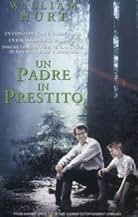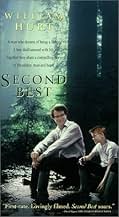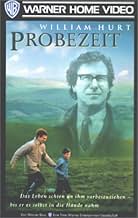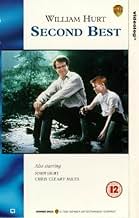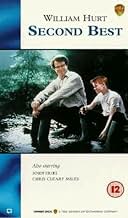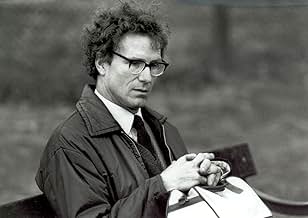Graham, a lonely Welsh postal worker, adopts James, a troubled ten-year-old boy. Graham always wanted a son, but James loves his biological father too much to give Graham a chance. Will the ... Read allGraham, a lonely Welsh postal worker, adopts James, a troubled ten-year-old boy. Graham always wanted a son, but James loves his biological father too much to give Graham a chance. Will the two be able to accept each other as family?Graham, a lonely Welsh postal worker, adopts James, a troubled ten-year-old boy. Graham always wanted a son, but James loves his biological father too much to give Graham a chance. Will the two be able to accept each other as family?
- Awards
- 1 win & 2 nominations total
Featured reviews
I've read the other reviews posted here and concur with all of them. The film triumphs in its realistic depiction of two broken hearts, Jamie's and Graham's. I think, in order to appreciate the story, one must have somehow experienced the psychic shock of childhood abandonment, either emotionally or by outright physical abandonment. The pleasure of watching this film, aside from the acting and cinematography, is having the sense that it will work out okay. At the very end, when Jamie walks briskly to catch up with Graham, slips his hand into the grownup's hand, and then walks much more slowly, one can see in their stride together the fulfillment each has received. I rewound the film at that point to see that scene again.
This is a moving, touching film. For me a little bit frightening too. In the real world there are some people, who behave like Holt. (Unimportant, but funny that the word "Holt" means Dead in Hungarian which is my first language.) This movie is like a therapy, an advice for unhappy, lonely people. A believable film is a great pleasure nowadays, but if you meet your own life face-to-face in a script, well... it's pretty scary. If you pay attention good enough, it changes your life! Thank God for this film!
David Cook, author of the novel of the same title and also involved in the film, is known for his sensitive and probing treatments of characters marginalized in society. After seeing the film, I made a point of searching for the book, and at long last spotted a "galley proof edition" in a used bookstore in Oxford. The picture is faithful to the novel-- if anything, excessively so. Much dialogue is reproduced intact. A number of small incidents and gestures which seem inconsequential or puzzling in the movie were revealed as symbols or evocations of episodes which the book had fleshed out. Directors themselves so immersed in every detail are at risk of assuming too much understanding from the audience, depriving them of just another few words, or a brief camera close-up, which would have put a point across coherently. But these are quibbles, for there is enough depth and quiet eloquence left here to call for a rare ten stars out of ten.
This is the story of an unlikely relationship which succeeds as the mutual balm for unusual wounds. The man Graham and the boy Jamie both suffer profoundly from separation from their fathers-- physical separation in Jamie's case (his adored dad is in prison), emotional in Graham's. Each discovers that the other cherishes the memory of just a few days of filial closeness, shattered shards of supreme bliss sparkling in the dismal landscape of their emotional lives. Yet not only does Graham, a candidate to adopt Jamie, lack the primary qualification for a stepfather: a wife. He is a shy nerd with no obvious charisma whatsoever for a hyperactive, street-wise, cynical kid.
But traumas in his past have stamped this boy with a vehement misogyny. As little as he fancies anyone presuming to take his father's place, he craves having a stepmother even less. Graham's bachelorhood is a relative advantage. Graham proves himself gradually with humility, honesty, and a quality of unfailing respect for the person struggling underneath Jamie's sullenness which one can only describe as reverence. A "special-ed" teacher of my acquaintance called Jamie (and Chris Cleary Miles' passionate characterization) very realistic, and pronounced Graham (as brought to life masterfully by William Hurt) "a genius" in his approach to the developing relationship.
While some will complain that this film drags, others will value its quiet atmosphere in which heart-codes are patiently decrypted. The more important the dialogue is, the likelier it is to approach whispers. One crucial central scene, barely audible, as the haunting strains of the score's "rift" theme echo away more faintly still, never to be heard again, must be one of the tenderest moments ever captured on celluloid.
Perhaps Graham has been plagued by a touch of agoraphobia. The cinematography deftly suggests this world view: interiors of small rooms, fussy wallpaper, obtrusive props, brilliant curtains covering the windows; exteriors somehow painting scenes of ravishing beauty with brushstrokes of vague terror.
Graham Holt is an unlikely hero, but a true one. If more people treated one another the way he does, the world would be a better place.
This is the story of an unlikely relationship which succeeds as the mutual balm for unusual wounds. The man Graham and the boy Jamie both suffer profoundly from separation from their fathers-- physical separation in Jamie's case (his adored dad is in prison), emotional in Graham's. Each discovers that the other cherishes the memory of just a few days of filial closeness, shattered shards of supreme bliss sparkling in the dismal landscape of their emotional lives. Yet not only does Graham, a candidate to adopt Jamie, lack the primary qualification for a stepfather: a wife. He is a shy nerd with no obvious charisma whatsoever for a hyperactive, street-wise, cynical kid.
But traumas in his past have stamped this boy with a vehement misogyny. As little as he fancies anyone presuming to take his father's place, he craves having a stepmother even less. Graham's bachelorhood is a relative advantage. Graham proves himself gradually with humility, honesty, and a quality of unfailing respect for the person struggling underneath Jamie's sullenness which one can only describe as reverence. A "special-ed" teacher of my acquaintance called Jamie (and Chris Cleary Miles' passionate characterization) very realistic, and pronounced Graham (as brought to life masterfully by William Hurt) "a genius" in his approach to the developing relationship.
While some will complain that this film drags, others will value its quiet atmosphere in which heart-codes are patiently decrypted. The more important the dialogue is, the likelier it is to approach whispers. One crucial central scene, barely audible, as the haunting strains of the score's "rift" theme echo away more faintly still, never to be heard again, must be one of the tenderest moments ever captured on celluloid.
Perhaps Graham has been plagued by a touch of agoraphobia. The cinematography deftly suggests this world view: interiors of small rooms, fussy wallpaper, obtrusive props, brilliant curtains covering the windows; exteriors somehow painting scenes of ravishing beauty with brushstrokes of vague terror.
Graham Holt is an unlikely hero, but a true one. If more people treated one another the way he does, the world would be a better place.
10ricrisci
This is an exquisitely poignant tale of a love-starved, troubled orphan boy and an emotionally incomplete man who has decided to reach out for what he wants most in life: a son. Jamie very much wants to love the kind man who wants to adopt him but is prevented from doing so by the promise he made to his biological father just before dad went to jail: to love him "best in the whole world forever." In what may just be the greatest dramatic performance by a child ever captured on film (surpassing even that of Freddie Bartholomew in "Captains Courageous" who had held that title for that past 60 years), Chris Cleary Miles demonstrates a precocity which makes one wonder if he hasn't already overcome some great tribulation(s?) in his short life in order to give such a compelling performance. Alternately masochistic, loving, violent and affectionate, the range and depth of emotion he portrays are nonpareil. I am still having trouble believing it was only a movie! It is unfortunate that Miles never acted in another movie; on the other hand, when you start at the top you can only go down.
Others have called this William Hurt's greatest role and I would have to agree. While his transformation from the stiff, detached loner to loving father was beautifully written in the book by David Cook, Hurt interprets this flawlessly. In fact you might say the film's brilliance was relatively easy on the heels of Cook's depictions. Nevertheless every scene in the movie is significant and the editing with the multiple flashbacks was excellent. Why this film did not win all kinds of awards is beyond me.
"Second Best" is second best to none in its genre.
Others have called this William Hurt's greatest role and I would have to agree. While his transformation from the stiff, detached loner to loving father was beautifully written in the book by David Cook, Hurt interprets this flawlessly. In fact you might say the film's brilliance was relatively easy on the heels of Cook's depictions. Nevertheless every scene in the movie is significant and the editing with the multiple flashbacks was excellent. Why this film did not win all kinds of awards is beyond me.
"Second Best" is second best to none in its genre.
Paul wrote a beautiful review with the proper amount of reverence towards what is in our culture almost a sacred subject, the father son relationship. This is the story of two such relationships, each one gone bad, and how the two survivors find the solution in each other and could find the solution in nobody else. The filmmakers also had a problem which needed a solution and found that in the cinematography, direction and marvelous acting and casting (several actors for each character at different ages) and music you'll remember long after the lights go up. Because it's such a small scale picture I would only give it a 9/10 and BenHur and Laurence of Arabia get a 10, yet they're no better, only bigger.
Did you know
- TriviaSeveral reviews claimed that this film is set in Wales, and a Welsh town was the chief location for the movie, but the setting is, in fact, never specified and the accents of the actors in the film cover a wide area across Britain. Although the American William Hurt was praised for learning a Welsh accent, he actually sounds more like an Englishman from the West Country. It is noticeable that all the road signs seen in the film are only in English, whereas road signs in Wales are always in both English and Welsh.
- ConnectionsFeatured in Siskel & Ebert & the Movies: Only You/Second Best/Pulp Fiction (1994)
- How long is Second Best?Powered by Alexa
Details
Box office
- Gross US & Canada
- $86,115
- Opening weekend US & Canada
- $19,190
- Oct 2, 1994
- Gross worldwide
- $86,115
- Runtime1 hour 45 minutes
- Color
- Sound mix
- Aspect ratio
- 1.85 : 1
Contribute to this page
Suggest an edit or add missing content




